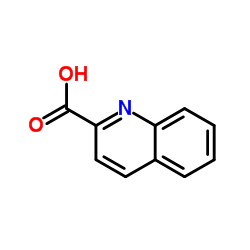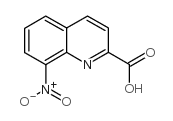2-Quinolinecarboxylicacid, 5-nitro-
Modify Date: 2025-11-13 14:55:46

2-Quinolinecarboxylicacid, 5-nitro- structure
|
Common Name | 2-Quinolinecarboxylicacid, 5-nitro- | ||
|---|---|---|---|---|
| CAS Number | 525-47-3 | Molecular Weight | 218.16600 | |
| Density | 1.545g/cm3 | Boiling Point | 431.1ºC at 760mmHg | |
| Molecular Formula | C10H6N2O4 | Melting Point | N/A | |
| MSDS | N/A | Flash Point | 214.5ºC | |
| Name | 5-Nitroquinoline-2-carboxylic acid |
|---|---|
| Synonym | More Synonyms |
| Density | 1.545g/cm3 |
|---|---|
| Boiling Point | 431.1ºC at 760mmHg |
| Molecular Formula | C10H6N2O4 |
| Molecular Weight | 218.16600 |
| Flash Point | 214.5ºC |
| Exact Mass | 218.03300 |
| PSA | 96.01000 |
| LogP | 2.36440 |
| Index of Refraction | 1.718 |
| InChIKey | PHELEJSJZGCLEJ-UHFFFAOYSA-N |
| SMILES | O=C(O)c1ccc2c([N+](=O)[O-])cccc2n1 |
|
Version 1.2
Regulation (EC) No 1907/2006 1 - Product and Company Information Product Name5-NITROQUINALDIC ACID - 25 MG 2 - Hazards Identification 3 - Composition/Information on Ingredients Product NameCAS #EC noAnnex I Index Number 5-NITROQUINALDIC ACID, 99%525-47-3 208-372-8 None FormulaC10H6N2O4 Molecular Weight 218,1700 AMU Synonyms5-Nitroquinaldic acid * 5-Nitroquinaldinic acid * 5-Nitro-2-quinolinecarboxylic acid * 2-Quinolinecarboxylic acid, 5-nitro- (9CI) 4 - First Aid Measures AFTER INHALATION If inhaled, remove to fresh air. If not breathing give artificial respiration. If breathing is difficult, give oxygen. AFTER INGESTION If swallowed, wash out mouth with water provided person is conscious. Call a physician. 5 - Fire Fighting Measures EXTINGUISHING MEDIA Suitable: Water spray. Carbon dioxide, dry chemical powder, or appropriate foam. SPECIAL RISKS Specific Hazard(s): Emits toxic fumes under fire conditions. SPECIAL PROTECTIVE EQUIPMENT FOR FIREFIGHTERS Wear self-contained breathing apparatus and protective clothing ALDRICHwww.molbase.com to prevent contact with skin and eyes. 6 - Accidental Release Measures PERSONAL PRECAUTION PROCEDURES TO BE FOLLOWED IN CASE OF LEAK OR SPILL Evacuate area. PROCEDURE(S) OF PERSONAL PRECAUTION(S) Wear self-contained breathing apparatus, rubber boots, and heavy rubber gloves. METHODS FOR CLEANING UP Sweep up, place in a bag and hold for waste disposal. Avoid raising dust. Ventilate area and wash spill site after material pickup is complete. 7 - Handling and Storage HANDLING Directions for Safe Handling: Do not breathe dust. Do not get in eyes, on skin, on clothing. Avoid prolonged or repeated exposure. STORAGE Conditions of Storage: Keep tightly closed. Store in a cool dry place. 8 - Exposure Controls / Personal Protection ENGINEERING CONTROLS Use only in a chemical fume hood. Safety shower and eye bath. GENERAL HYGIENE MEASURES Wash thoroughly after handling. Wash contaminated clothing before reuse. PERSONAL PROTECTIVE EQUIPMENT Special Protective Measures: Wear appropriate government approved respirator, chemical-resistant gloves, safety goggles, other protective clothing. 9 - Physical and Chemical Properties pH N/A BP/BP RangeN/A MP/MP Range203,000 °C Flash PointN/A FlammabilityN/A Autoignition TempN/A Oxidizing Properties N/A Explosive Properties N/A Explosion LimitsN/A Vapor PressureN/A Partition Coefficient N/A ViscosityN/A Vapor DensityN/A Saturated Vapor Conc. N/A Evaporation RateN/A Bulk DensityN/A Decomposition Temp.N/A Solvent ContentN/A ALDRICHwww.molbase.com Water ContentN/A Surface TensionN/A ConductivityN/A Miscellaneous DataN/A SolubilityN/A 10 - Stability and Reactivity STABILITY Materials to Avoid: Strong oxidizing agents, Strong bases. HAZARDOUS DECOMPOSITION PRODUCTS Hazardous Decomposition Products: Carbon monoxide, Carbon dioxide, Nitrogen oxides. 11 - Toxicological Information RTECS NUMBER: UZ9580000 SIGNS AND SYMPTOMS OF EXPOSURE To the best of our knowledge, the chemical, physical, and toxicological properties have not been thoroughly investigated. ROUTE OF EXPOSURE Multiple Routes: Harmful if swallowed, inhaled, or absorbed through skin. May cause irritation. CHRONIC EXPOSURE - MUTAGEN ZPOS Histidine reversion (Ames) 12 - Ecological Information No data available. 13 - Disposal Considerations SUBSTANCE DISPOSAL Dissolve or mix the material with a combustible solvent and burn in a chemical incinerator equipped with an afterburner and scrubber. Observe all federal, state, and local environmental regulations. 14 - Transport Information RID/ADR Non-hazardous for road transport. IMDG Non-hazardous for sea transport. IATA Non-hazardous for air transport. 15 - Regulatory Information COUNTRY SPECIFIC INFORMATION Germany ALDRICHwww.molbase.com WGK: 3 Self-Classification 16 - Other Information WARRANTY The above information is believed to be correct but does not purport to be all inclusive and shall be used only as a guide. The information in this document is based on the present state of our knowledge and is applicable to the product with regard to appropriate safety precautions. It does not represent any guarantee of the properties of the product. Inc., shall not be held liable for any damage resulting from handling or from contact with the above product. See reverse side of invoice or packing slip for additional terms and conditions of sale. Copyright 2010 Co. License granted to make unlimitedpaper copies for internal use only. DISCLAIMER For R&D use only. Not for drug, household or other uses. ALDRICHwww.molbase.com SECTION 16 - ADDITIONAL INFORMATION N/A |
CHEMICAL IDENTIFICATION
HEALTH HAZARD DATAACUTE TOXICITY DATAMUTATION DATA
|
| HS Code | 2933499090 |
|---|
|
~% 
2-Quinolinecarb... CAS#:525-47-3 |
| Literature: Besthorn; Ibele Chemische Berichte, 1906 , vol. 39, p. 2333 |
|
~% 
2-Quinolinecarb... CAS#:525-47-3 |
| Literature: Besthorn; Ibele Chemische Berichte, 1906 , vol. 39, p. 2333 |
| Precursor 1 | |
|---|---|
| DownStream 0 | |
| HS Code | 2933499090 |
|---|---|
| Summary | 2933499090. other compounds containing in the structure a quinoline or isoquinoline ring-system (whether or not hydrogenated), not further fused. VAT:17.0%. Tax rebate rate:13.0%. . MFN tariff:6.5%. General tariff:20.0% |
| 5-NITROQUINALDIC ACID |
| 5-Nitro-2-quinolinecarboxylic acid |
| EINECS 208-372-8 |
| 2-Quinolinecarboxylic acid,5-nitro |
| 5-Nitroquinaldinic acid |
| Quinaldic acid,5-nitro |

